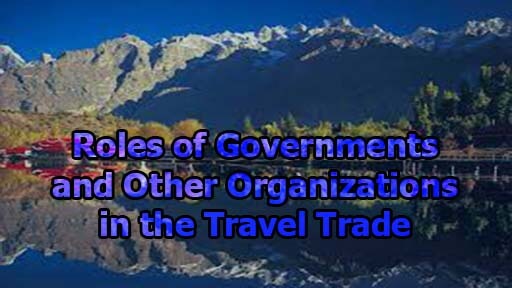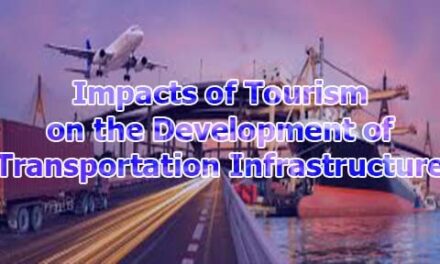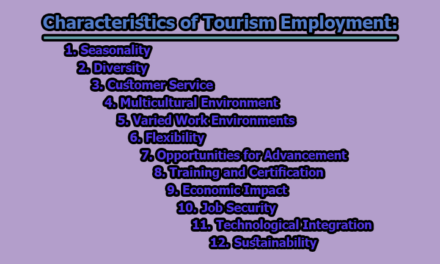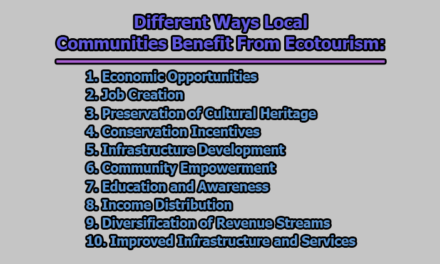Roles of Governments and Other Organizations in the Travel Trade:
Travel is an essential part of our lives, and the travel industry is one of the most significant contributors to the global economy. The travel trade is an intricate ecosystem that involves various stakeholders, including governments, travel agents, airlines, hotels, tour operators, and travelers. Each of these stakeholders plays a crucial role in the industry, and their actions and decisions have a significant impact on the travel trade. In this article, we will explore the roles of governments and other organizations in the travel trade.
Roles of Governments in the Travel Trade:
Governments play a critical role in the travel trade, as they are responsible for creating policies and regulations that affect the industry. These policies and regulations can be broadly categorized into two categories: those that promote the industry and those that regulate it.
- Promotion of the Industry: Governments around the world recognize the importance of the travel industry and actively promote it to boost their economies. They do this by developing marketing campaigns and providing incentives to attract tourists to their countries. For example, some governments offer tax breaks to airlines and hotels that invest in their countries, while others provide funding for tourism marketing campaigns.
Governments also work to improve the infrastructure that supports the travel industry, such as airports, roads, and public transport. This infrastructure is essential for attracting tourists and ensuring that they have a pleasant experience when traveling.
- Regulation of the Industry: Governments also regulate the travel industry to ensure that it operates in a safe, fair, and ethical manner. This includes setting standards for airline safety, regulating the use of travel agents, and ensuring that hotels meet certain quality standards.
Governments also work to protect travelers by providing travel advisories and warnings about areas that may be unsafe to travel to. They may also require airlines and travel agents to provide insurance to protect travelers in case of unforeseen events, such as flight cancellations or medical emergencies.
Roles of International Organizations in the Travel Trade:
In addition to governments, international organizations also play a critical role in the travel trade. These organizations work to promote the industry and develop standards and guidelines to ensure that it operates in a safe, fair, and ethical manner.
- World Tourism Organization (UNWTO): The World Tourism Organization (UNWTO) is the leading international organization in the field of tourism. It works to promote sustainable and responsible tourism and provides support and guidance to governments and other organizations in the travel trade.
One of the primary roles of the UNWTO is to collect and analyze data on tourism trends and issues. This information is used to develop policies and strategies that promote the industry and address its challenges.
- International Air Transport Association (IATA): The International Air Transport Association (IATA) is a trade association that represents airlines around the world. It works to promote the interests of the airline industry and improve its efficiency and safety.
One of the primary roles of IATA is to develop and implement standards and guidelines for the airline industry. This includes standards for airline safety, security, and environmental performance. IATA also provides training and certification programs for airline personnel to ensure that they meet these standards.
- Roles of Travel Agents in the Travel Trade: Travel agents are intermediaries between travelers and the various stakeholders in the travel industry. They play a critical role in helping travelers plan and book their trips, and they provide a range of services, including:
- Providing information on destinations, travel options, and prices
- Booking flights, hotels, rental cars, and other travel services
- Advising travelers on travel insurance and visa requirements
- Providing assistance in case of travel disruptions or emergencies
Travel agents earn commissions on the travel services they book, and they may also charge fees for their services. They are regulated by governments to ensure that they operate in a fair and ethical manner and provide accurate information to their clients.
- Roles of Airlines in the Travel Trade: Airlines are a crucial stakeholder in the travel trade, as they provide the means of transportation for travelers. They are responsible for ensuring the safety and comfort of their passengers, and they play a significant role in promoting and developing the industry.
Airlines are regulated by governments and international organizations to ensure that they meet safety and security standards. They are also required to comply with environmental regulations and work to reduce their carbon footprint.
Airlines also work to develop new routes and expand their networks to promote tourism in different destinations. They may partner with governments and other organizations to develop marketing campaigns and offer incentives to attract tourists.
- Roles of Hotels and Accommodation Providers in the Travel Trade: Hotels and other accommodation providers are essential for providing travelers with a place to stay during their trips. They play a significant role in promoting the industry and ensuring that travelers have a comfortable and enjoyable experience.
Hotels and accommodation providers are regulated by governments to ensure that they meet quality standards and provide safe and healthy environments for their guests. They are also required to comply with environmental regulations and work to reduce their impact on the environment.
Hotels and accommodation providers may work with governments and other organizations to promote tourism in their destinations. They may also partner with airlines and travel agents to offer package deals and discounts to attract travelers.
- Roles of Tour Operators in the Travel Trade: Tour operators are companies that specialize in organizing and selling tour packages to travelers. They play a crucial role in promoting and developing the industry by creating unique and attractive tour packages and promoting tourism in their destinations.
Tour operators work with governments, airlines, hotels, and other stakeholders to create tour packages that meet the needs and interests of different types of travelers. They may offer guided tours, adventure tours, cultural tours, and other types of tours.
Tour operators are regulated by governments to ensure that they operate in a fair and ethical manner and provide accurate information to their clients. They are also required to comply with safety and environmental regulations and work to reduce their impact on the environment.
- Roles of Travelers in the Travel Trade: Travelers are the most important stakeholders in the travel trade, as they are the ones who generate demand for travel services. They play a critical role in promoting and developing the industry by choosing destinations, booking travel services, and sharing their experiences with others.
Travelers have a responsibility to travel responsibly and sustainably, by respecting local cultures and customs, minimizing their impact on the environment, and supporting local economies. They can do this by choosing responsible travel companies, staying in eco-friendly accommodations, and participating in sustainable tourism activities.
From the above discussion, we can say that the travel trade is a complex ecosystem that involves various stakeholders, including governments, international organizations, travel agents, airlines, hotels, tour operators, and travelers. Each of these stakeholders plays a crucial role in promoting and developing the industry and ensuring that it operates in a safe, fair, and ethical manner. Governments and international organizations work to promote the industry and regulate its operations. Travel agents, airlines, hotels, and tour operators provide travel services and promote tourism in different destinations. Travelers generate demand for travel services and have a responsibility to travel responsibly and sustainably. By working together, these stakeholders can create a vibrant and sustainable travel industry that provides economic, social, and environmental benefits to communities around the world.
References:
- United Nations World Tourism Organization. (2021). About UNWTO.
- World Travel & Tourism Council. (2021). The role of government in travel & tourism.
- International Air Transport Association. (2021). About IATA.
- International Civil Aviation Organization. (2021). About ICAO.
- United Nations Environment Programme. (2021). Sustainable tourism.
- American Hotel & Lodging Association. (2021). About AHLA.
- World Tourism Organization. (2019). Global report on adventure tourism.
- Tour Operators Initiative for Sustainable Tourism Development. (2021). About TIST.
- Global Sustainable Tourism Council. (2021). Sustainable tourism criteria.
- World Wildlife Fund. (2021). Tips for responsible travel.
- S. Department of State. (2021). Bureau of Consular Affairs.
- European Commission. (2021). Transport.
- Travel Agents Association of India. (2021). About TAAI.

Assistant Teacher at Zinzira Pir Mohammad Pilot School and College










